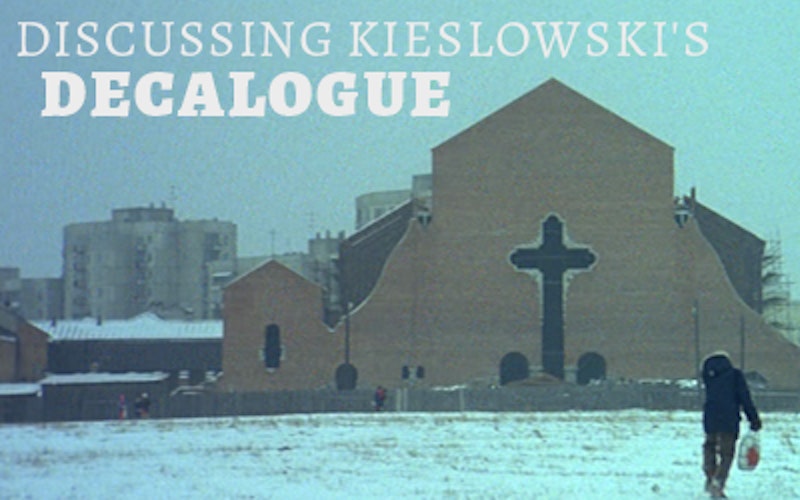
Movies
Discussing Kieslowski’s Decalogue III
This is part of a joint series with Elijah Davidson of Reel Spirituality, in which we’re considering each installment of The Decalogue. Krzysztof Kieslowski's landmark collection of short films was first released on Polish television in 1989 and is based on each of the Ten Commandments. Links to our other posts can be found here.
Something we’ve been talking about, Elijah – particularly in the comments to our previousposts – is the role of the Old Testament Law in these films, and I think that gets even murkier in Decalogue III. This is a night with “sinners” who are suffering greatly, yet I’m not sure the movie is all that quick to blame their sins.
More of a chamber piece than the first two installments, Decalogue III mostly consists of scenes between Janus (Daniel Olbrychski) and Ewa (Maria Pakulnis). Former, illicit lovers whose affair was discovered a few years ago, Ewa and Janus have kept apart until the Christmas Eve night during which the film takes place. As Janus is half-heartedly going through his familial motions (playing Santa to his kids, toasting the holiday with his mother-in-law and wife), Ewa unexpectedly reappears and asks him to help her look for her missing husband.
In our discussion, it’s been suggested that the Ten Commandments exist – both in life and in The Decalogue – for a variety of reasons: to point the way to Christ; to humble us in our humanity; to erect a societal framework within which the human story can unfold. Could it also be, at least in Decalogue III, that the Law is seen as a hindrance to human happiness, in that being tied to it can the foster the same sort of pain and suffering it ostensibly means to prevent?
Could it also be that the Law is seen as a hindrance to human happiness?
Follow me here. Ewa and Janus are sorrowful - even suicidal - figures in the wreckage of their exposed affair. True, their adulterous acts caused this pain, but in another sense you could say it was the Law’s insistence on marital fidelity that forced them into this spiral of deceit. Not only did they initially lie about the affair in order to maintain society’s expectation for marriage, but they now continue to lie by maintaining marriages to which they’re not committed. Would a society without fidelity – one in which people could be honest about who they love, even when that changes – be one that would result in less deception and pain?
Obviously I’m playing a bit of devil’s advocate, as that sort of reasoning hardly aligns with a Christian understanding of marriage as a sacrament, one in which self-sacrifice - not self-fulfillment - is a central tenet. Yet Decalogue III is slippery enough to make me wonder if this series is not so much a bolstering or even a benign observing of the Law but, in some ways, a criticism of it.
Have you gotten this sense at all, Elijah, from Decalogue III or the other two installments? In our focus on how The Decalogue aligns with Christian thinking, are we perhaps missing some element of critique?
Topics: Movies